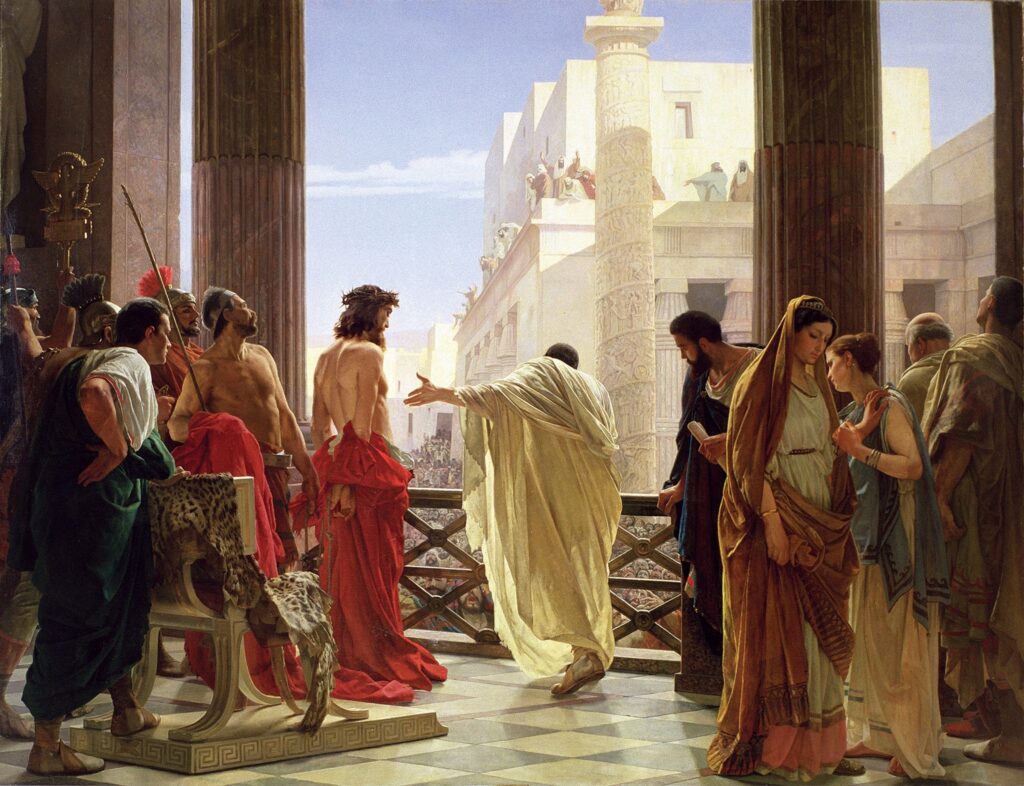* * * *

* * * *
I started to call this post, “Whatever you do, can be done to you.” I wanted to do that because of the upcoming presidential election, with its promises of lots of payback and throwing political opponents in jail. (Not to mention “dictatorship.”) But I figured the more Christian thing to do was focus on Lent – and hope that maybe some Lenten discipline might keep such bad things from happening. Besides, doesn’t the Bible say “Vengeance is mine, sayeth the Lord?”
Well yes, but some wag added, “Vengeance is mine, sayeth the Lord, but sometimes it’s hard not to get a jump on it yourself.” Which brings up a more earthly incentive, for anyone tempted to throw people in jail for having a different opinion. “Whatever you do, could be done to you in return.” (With a possible addendum, “Once you leave office.”)
Some people call that karma, while others call it the Goose-Gander theory. (“What’s good for the goose,” etc.) But Jesus put it this way, “Judge not, lest ye be judged.” (In the King James Version, the one God uses.) But that might be too subtle for some people, which leads to the more direct, “Whatever you do could be done to you in return.” But that’s enough of a Rabbit Trail.
It’s time to get back to this year’s Lenten discipline. And maybe look back at some of my past disciplines? For example, in 2016 I noted that while most people see Lent as giving up something, others choose to do something positive, to “add to my spiritual life.” Then too:
For my part, I’ve always wondered just when, where and how Moses came to write the first five books of the Bible. (The Torah.) So I’ve decided that – aside from Bible-reading on a daily basis, which I already do anyway – I’ll spend this [2016] Lent “meditating” on this topic.
You could also say I was contemplating about when, where and how Moses wrote the Torah. “Profoundly thinking about something.” Which led me to phrase the question this way: “What did Moses know, and when did he know it?” For example, did Moses know the full story of that “big bright thing in the sky?” Did he know – far in advance of his fellow Israelites – that the “earth” revolves around the “sun?” And if he did know that, would he want to share that information with the newly-liberated, largely-illiterate former slaves?
My own theory came to be that if Moses did know the earth revolved around the Sun, he’d be wise not to share that information. He could have been stoned – and not in the good way – for “heresy.” As it was, he’d already come close to being killed by the tribe of unwashed habiru he was supposedly leading. That’s a subject I explored in On Moses getting stoned.
Or think if you could go back in time – say, back to 1963 and your 7th-grade home room class – and started trying to explain what comes in 50 years. “For one thing, cash will become passé. You’ll have these plastic cards, see, and when you buy something you’ll just stick this card in a machine. Also, you’ll have a phone with no cords, that you can take anywhere, even out driving. Also, you’ll see people walking around who seem to be talking to themselves, but they’re actually chatting – by phone – to people miles away, through this thing they stick in their ear..”
And remember that scene in Back to the Future? Where Marty tells Doc that in 1980 Ronald Reagan will be president? Only you’d tell your fellow 7th-graders that Donald Trump will be elected president in 2016. And if you told your 7th-grade classmates all that – along with copy machines and home computers – you’d be lucky just to wind up in the local psych ward.
But all this is just another way of saying there are some things beyond our ability to comprehend. For example, “our puny little human minds are simply incapable of fully understanding God.” Or as one professor put it – about our inherent inability to understand God:
We are simply not up to the task, not wired for such an overload. We are no more prepared to comprehend [God] than – to make use of a memorable example – cats are prepared to study calculus. It’s just not in our nature. (E.A.)
In plain words, there was a vast difference between what Moses knew – from 40 years as a highly-learned Prince of Egypt, with all the “scroll learning” that meant – and what he could reasonably share with his largely illiterate audience of former slaves.
In plain terms, Moses was forced by circumstances beyond his control “to use language and concepts that his ‘relatively-pea-brained contemporary audience’ could understand.”
To sum up, Moses was well advised not to write the “learned treatise” that some people expect of the Bible. If he had presented such a learned treatise to his fellow Hebrews – if he had mentioned dinosaurs, or the earth being billions of years old, or the earth revolving around that “big bright round thing in the sky – his “people” would have thought him crazy, or worse. Just like there were about to do in Numbers 14:10, when “all the congregation said to stone them with stones.” (Moses, along with Joshua and Caleb, who tried to defend him.)
For that matter, just like if you went back in time to 1963 and tried to tell fellow 7th-graders of “50 years from now:” Of buying things without cash, of wandering around talking to yourself but really talking with someone miles away, or of typing out words on a small plastic device and sending out information literally over the world – and all with the touch of a button!
Hmmm. Not a bad set of meditations to start out Lent 2024 with…
Happy Contemplating!
* * * *

* * * *
The upper image is courtesy of Vengeance Is Mine Sayeth The Lord … Image Results. (And by the way, I would have capitalized the “He.”) The link included the “get a jump on it” quote attributed to Robin Brande. The “vengeance is mine” comes from Romans 12:19, with cross-references to Leviticus 19:18, Deuteronomy 32:35, and Proverbs 20:22.
The Book of Common Prayer reference. The “corporate-mystical” prayer is on page 339, the post-communion prayer for Holy Eucharist, Rite I.
Re: “Judge not.” See Matthew 7:1 “Do not judge, or you will be judged. – Bible Hub.
Re: Lent. See also Lenten disciplines: spiritual exercises or ego trip?
For this post I borrowed from – in no chronological order – My Lenten meditation (2016), On Ash Wednesday – 2022, On the beginning of Lent – 2018, and from 2019, OMG! Is it time for Lent again?
“Habiru.” Basically, “desert cutthroats.” See the “Stoned” post, which also includes my take on why Moses didn’t write out the “learned treatise” that some scoffers think the Torah should have been.
The “scroll learning” link is to Book Learning Definition … YourDictionary, on knowledge “gained from reading or study rather than from practical experience.” But Moses seems to have had both…
The lower image is courtesy of Image Back To The Future Ronald Reagan President – Image Results. For a “live” version see Videos for Image Back To The Future Ronald Reagan President Youtube. Which includes quotes that Reagan “loved the movie.”
* * * *

